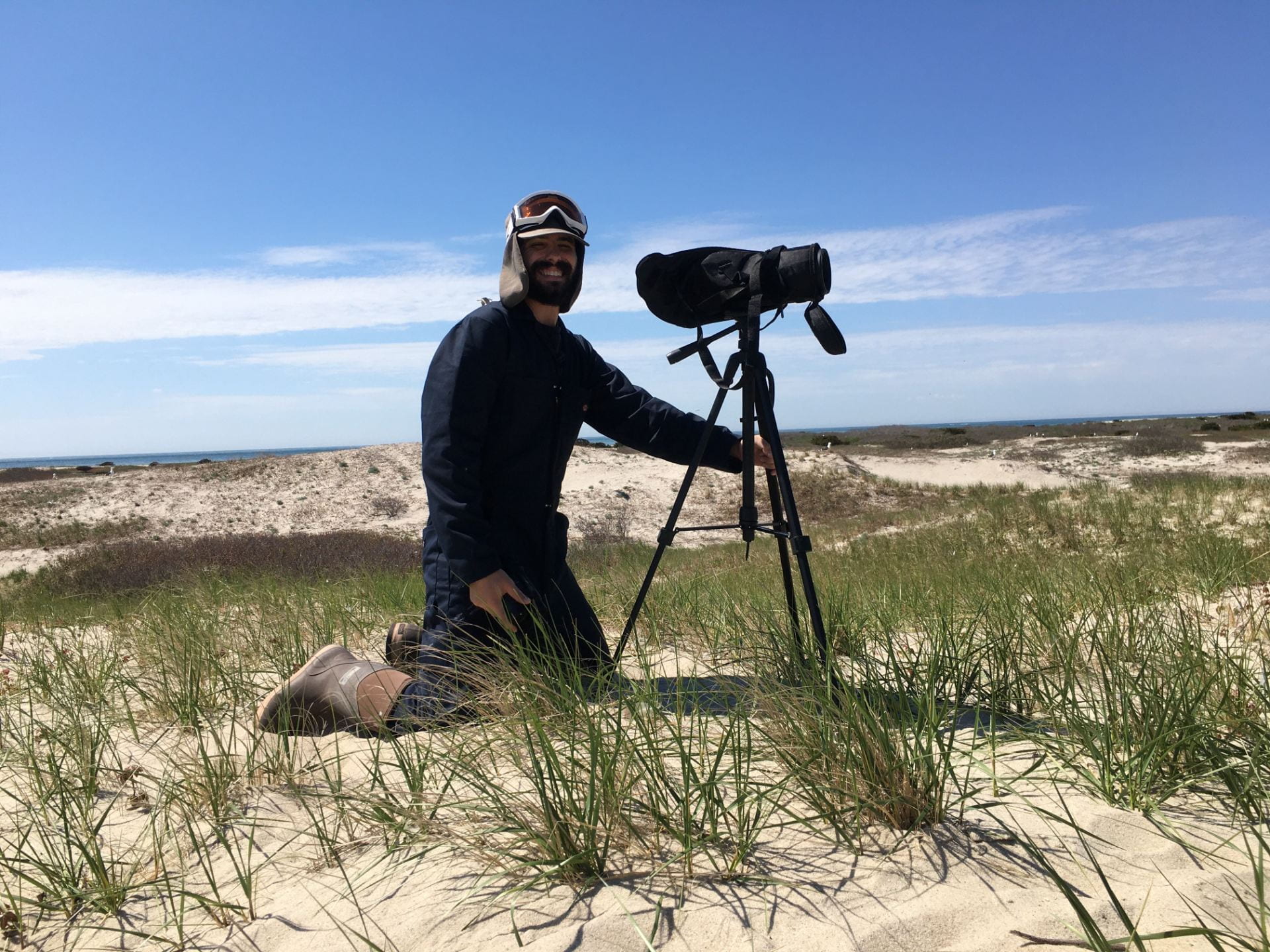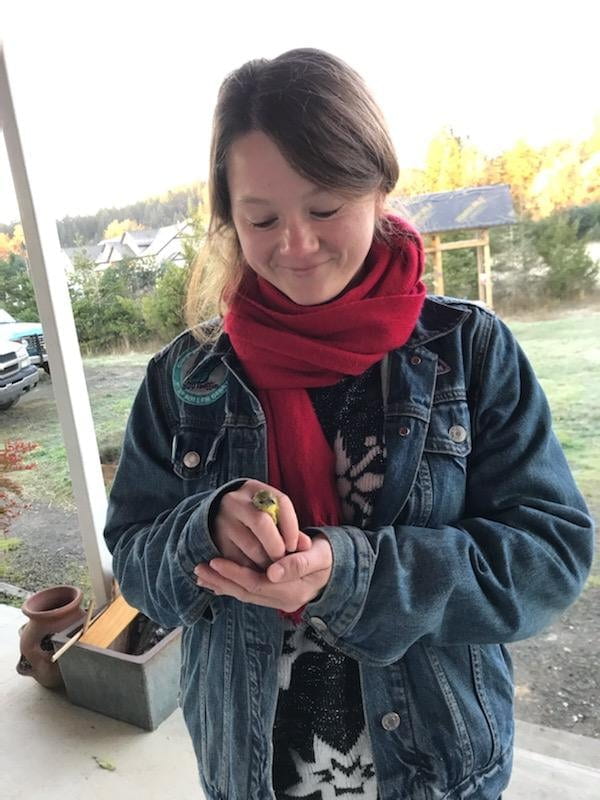Thorne Lab Alumni
Stephanie Adamczak

Master of Science in Marine Science, 2018
A Comparison of Short- and Long-finned Pilot Whale Thermal Ecology Using External Morphometrics, 3D Modeling, and Dive Behavior
The first paper from Stephanie’s thesis was published in Frontiers in Marine Science and the second paper just came out in the Journal of Biogeography.
Currently, Stephanie is pursuing her Ph.D. in Ecology and Evolutionary Biology at UCSC with the Costa Lab. She will be contributing to the population consequences of disturbance (PCoD) framework by building Stochastic Dynamic Programming models for small cetaceans and outlining minimum body condition thresholds for marine mammals. Her primary research interests focus on understanding the intersection between marine mammal behavior, reproductive success, and survival.
Julia Donaton

Master of Science in Marine Science, 2017
Diet analysis of loggerhead sea turtle diet in New York waters
Check out Julia’s paper “Long-term changes in loggerhead sea turtle diet indicate shifts in the benthic community associated with warming temperatures” in Estuarine, Coastal and Shelf Science
Matthew Fuirst

Master of Science in Marine Science, 2018
A Comparison of Herring Gull Foraging Ecology and Microbiome Along an Urban Gradient
Matt’s thesis research was published in PLOS one in December 2018
Matt is currently completing his PhD in Integrative Biology at the University of Guelph with the Norris Lab. He is primarily working with the long-term population study on Canada jays in Algonquin Provincial Park where he is integrating demographic and radio-telemetry data to better understand how climatic conditions are influencing reproductive success and dispersal movements.
Julia Stepanuk

Master of Science in Marine Science, 2017
Doctor of Philosophy in Ecology and Evolution, 2022
Julia completed her Master’s in the Thorne Lab 2017, entitled “Spatiotemporal patterns of short-finned pilot whale and pelagic longline distribution in the Northwest Atlantic: An assessment to inform the management of fisheries bycatch” and continued on to complete her PhD in the Thorne Lab in 2022. Her dissertation focused on rorqual distributions and foraging behavior in the Northeast US. She has continued her career as a Quantitative Ecologist at the Biodiversity Research Institute.
Julia published her MS research in Fisheries Research in 2018
Check out one of her dissertation chapter publications in Marine Ecology Progress Series
Melinda Conners

Post-doc completed in 2021
Melinda completed a post-doc in 2022 focusing on quantifying the relationship between wind conditions and energetics s of albatross species breeding on South Georgia using heart rate, magnetometer, and accelerometer data. This work will increase our understanding of dynamic energy landscapes in the ocean for pelagic seabirds who rely on wind to forage across vast distances.
Check out Melinda’s publication: Hidden Markov Models identify major movement modes in accelerometer and magnetometer data from four albatross species, published in Movement Ecology (2021)
Dallas Jordan

Master of Science in Marine Science, 2022
Divergent post-breeding spatial characteristics of sympatric albatross species in the North Pacific; https://doi.org/10.3389/fevo.2022.1028317
Dallas completed his Master’s at SoMAS in 2022 and continues to work in the field of seabird research in the UK. Dallas’ thesis focuses on the post-breeding distributions of black-browed and laysan albatross from two breeding colonies in the North Pacific.
Kelsey Roberts

Post-doc completed in 2022
Kelsey completed a post-doc in 2022 developing spatially explicit models to examine how oceanographic and atmospheric variability affect the abundance and distribution of fish and marine mammals in the Northeast Atlantic. Ultimately, these models can be used to better understand the spatio-temporal variability in species overlap and potentially contribute to management strategies to reduce negative impacts on threatened species.
Alex Borowicz

Postdoc completed in 2022
Alex is a postdoc in the Thorne Lab. He completed a PhD in Ecology and Evolution at Stony Brook University in 2021, developing methods to bridge the divide between data science and conservation practice and research. Alex’s background is in polar ecology, especially with regards to the distribution of penguin and seal species. In the Thorne Lab, Alex works on AI for applied conservation, developing standards for the automated detection of whales during offshore wind energy development. He is motivated by a desire to pair science with action. Reach him at www.alexborowicz.com or on Twitter @alexadelante.
Ellie Heywood

Lab technician 2019 through 2022
Ellie obtained a B.A. in biology from Occidental College in Los Angeles and a Master of Environmental Management degree from the Nicholas School of the Environment at Duke University. Within the Thorne lab, her main role is to provide support for the New York Bight monitoring project. Prior to joining the Thorne Lab, she worked for the Marine Geospatial Ecology Lab at Duke University on the Migratory Connectivity in the Ocean (MiCO) System as the taxa lead for marine mammals and seabirds. Ellie has extensive experience in marine mammal and seabird field research, geospatial ecology, and marine conservation. She also has experience with the collection, management, and analysis of marine acoustic datasets. Her main interests lie in movement and behavioral ecology, and conservation solutions for marine vertebrates.
twitter: @feministsailor
Google Scholar: https://scholar.google.com/citations?user=svLvl-EAAA
Siobhan Keeling

Master’s in Marine Conservation Policy 2021-2022
Siobhan completed her Master’s in Marine Conservation and Policy (MCP) at Stony Brook in 2021. Her capstone project was studying humpback whale entanglement in the NY Bight. She continues to work in the realm of marine policy to help protect our ocean giants.
Madeleine Foley

Masters of Science, Marine Science 2023
Madeleine completed her MSc in the Thorne lab in 2023. Her thesis work focused on understanding how temporal and spatial predictability drives the foraging movements of gulls. Madeleine continues her work in marine science as a fellow for Oregon Seagrant’s fisheries policy sector.
Kimberly Lato

Doctor of Philosophy in Marine Science, 2024
Kim finished her PhD in the School of Marine and Atmospheric Sciences in 2024. Her research focused on the effects of urban foraging on the movement and trophic ecology of herring and great black-backed gulls in the northeast, US. Kim is driven by her love for wildlife and understanding direct and indirect human impacts to these populations.
Check out one of her dissertation chapter publications: https://esajournals.onlinelibrary.wiley.com/doi/full/10.1002/ecs2.4643
Taylor Evans

Taylor completed a postdoc in the Thorne Lab studying the environmental drivers of North Atlantic Right Whale habitat use in Southern New England. She earned her PhD at Georgetown University with the Shark Bay Dolphin Research Project investigating the stability, vertical transmission, and fitness consequences of socio-ecological strategies in bottlenose dolphins. Further back in time, Taylor earned a B.S. in Biology from UCLA studying everything from sea anemone personality to roadkill ecology. She then worked for the CA Department of Fish and Wildlife collecting data on recreational fisheries and for the Ocean Conservation Society studying cetaceans in Santa Monica Bay. Her research interests center on longitudinal, individually based datasets and the interaction between behavioral phenotypes, population dynamics, and the environment. Outside the lab, you can generally find her adventuring with her dog Barley and/or taking pictures of birds.